Flashback to the ’80s, former O Positive frontman Dave Herlihy drops first album in two decades
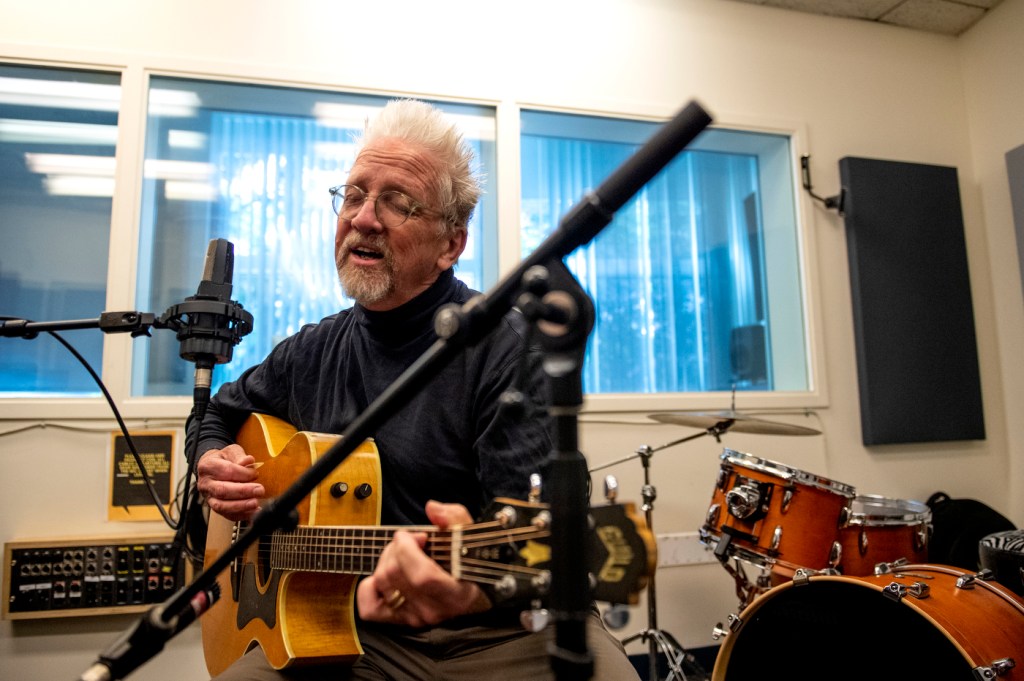
Students past or present in Northeastern’s music industry concentration are likely familiar with this mantra: “Be great, get paid.” That phrase is often said by program coordinator Dave Herlihy as a reminder that no matter what you do in the business—be an artist, work at a label, dive into ethnomusicology, and so on—you can make a living from your love for music with the right skills.
More to the point, Herlihy is an embodiment of being great and getting paid in the music business: Before becoming a Northeastern instructor and entertainment lawyer, he was the frontman of O Positive, a mainstay of the Boston ’80s alt-rock scene.
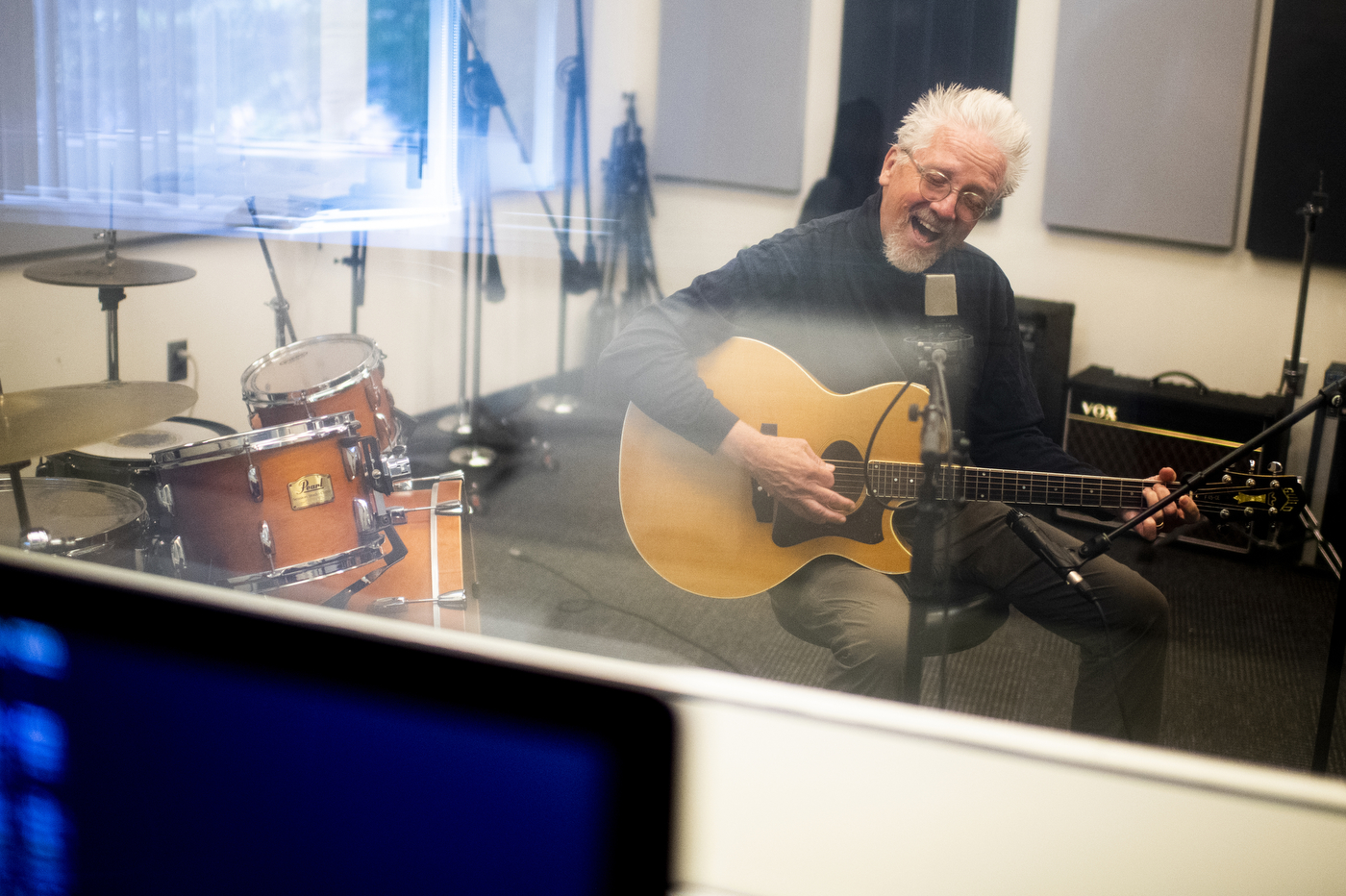
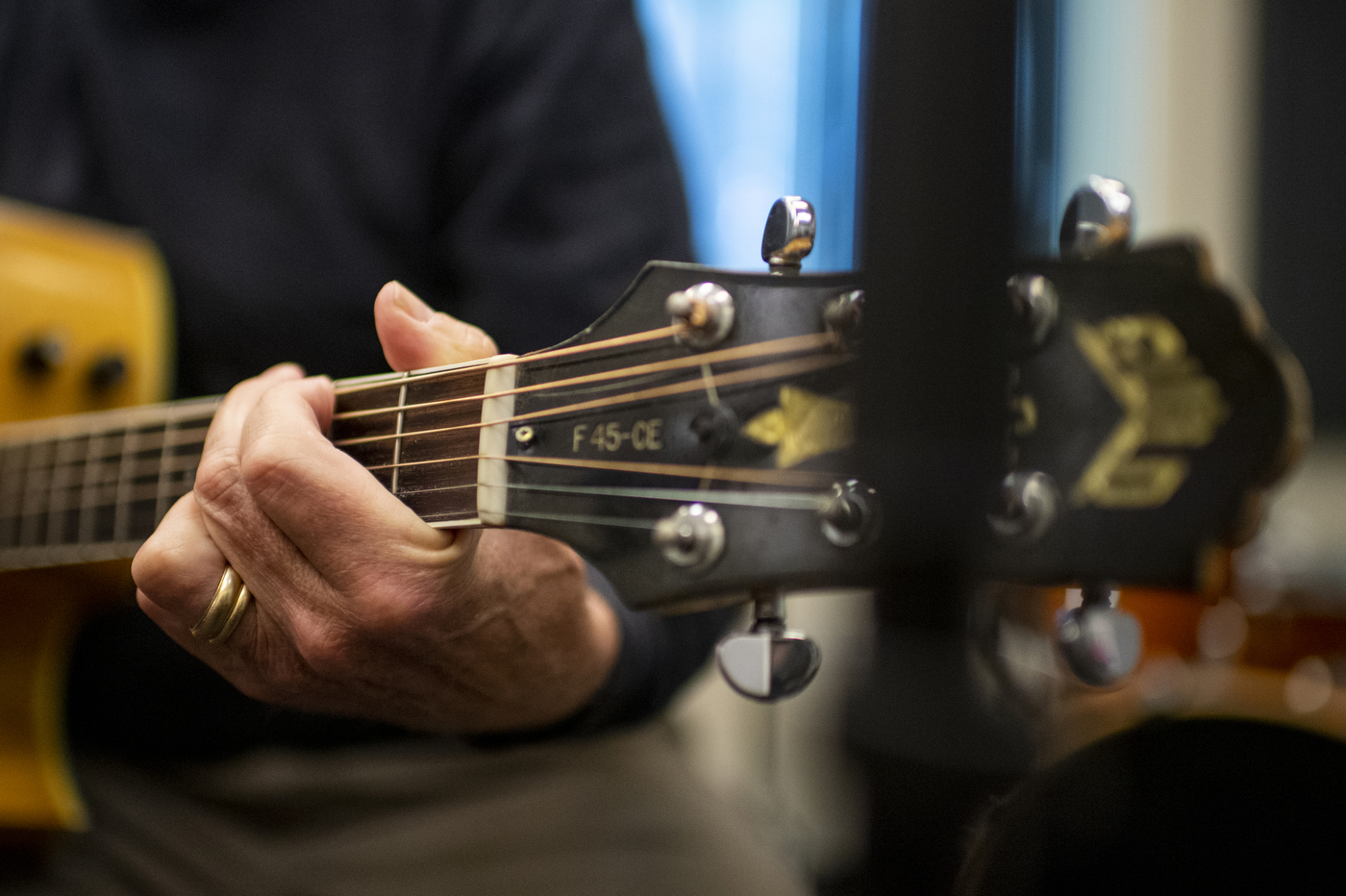
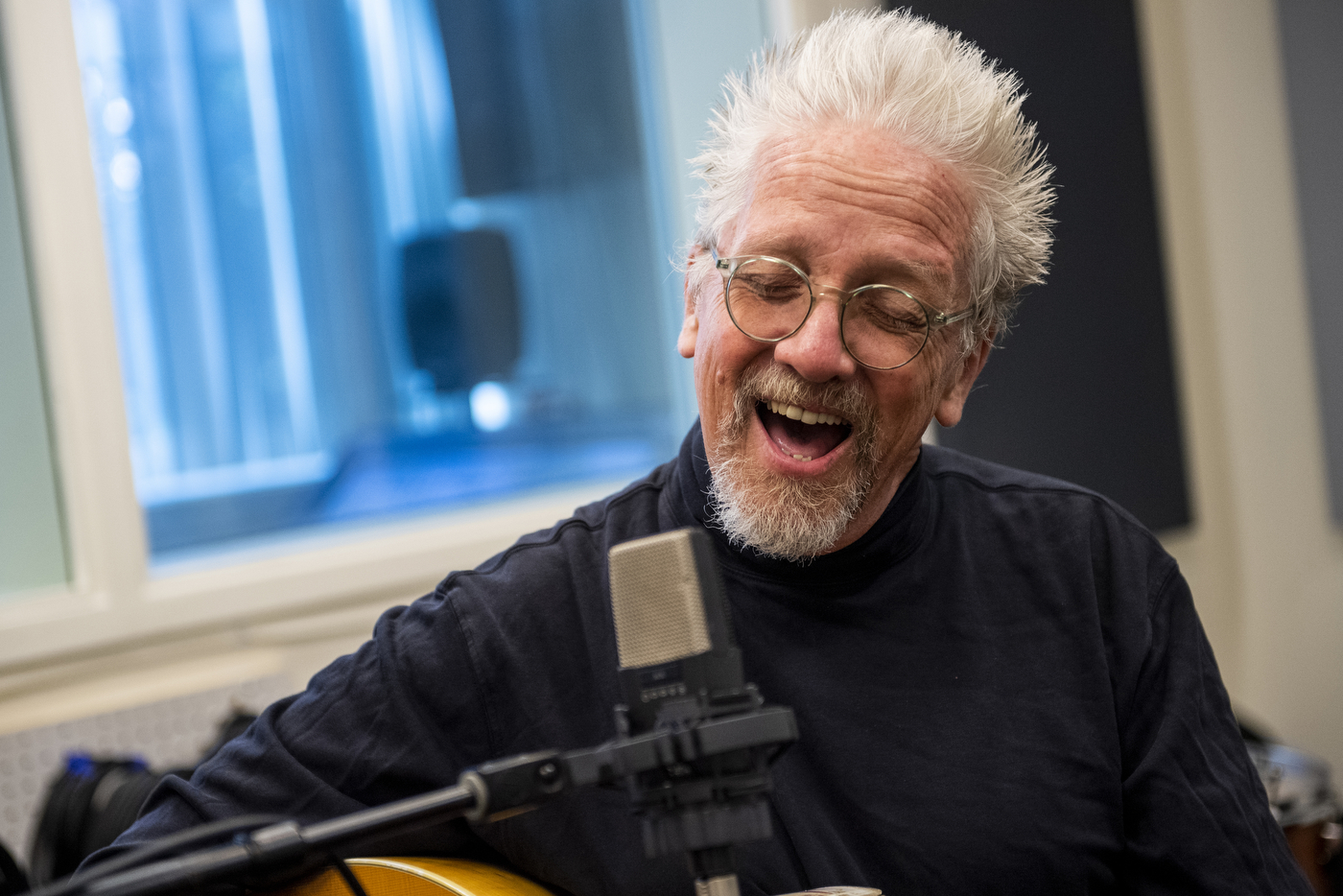
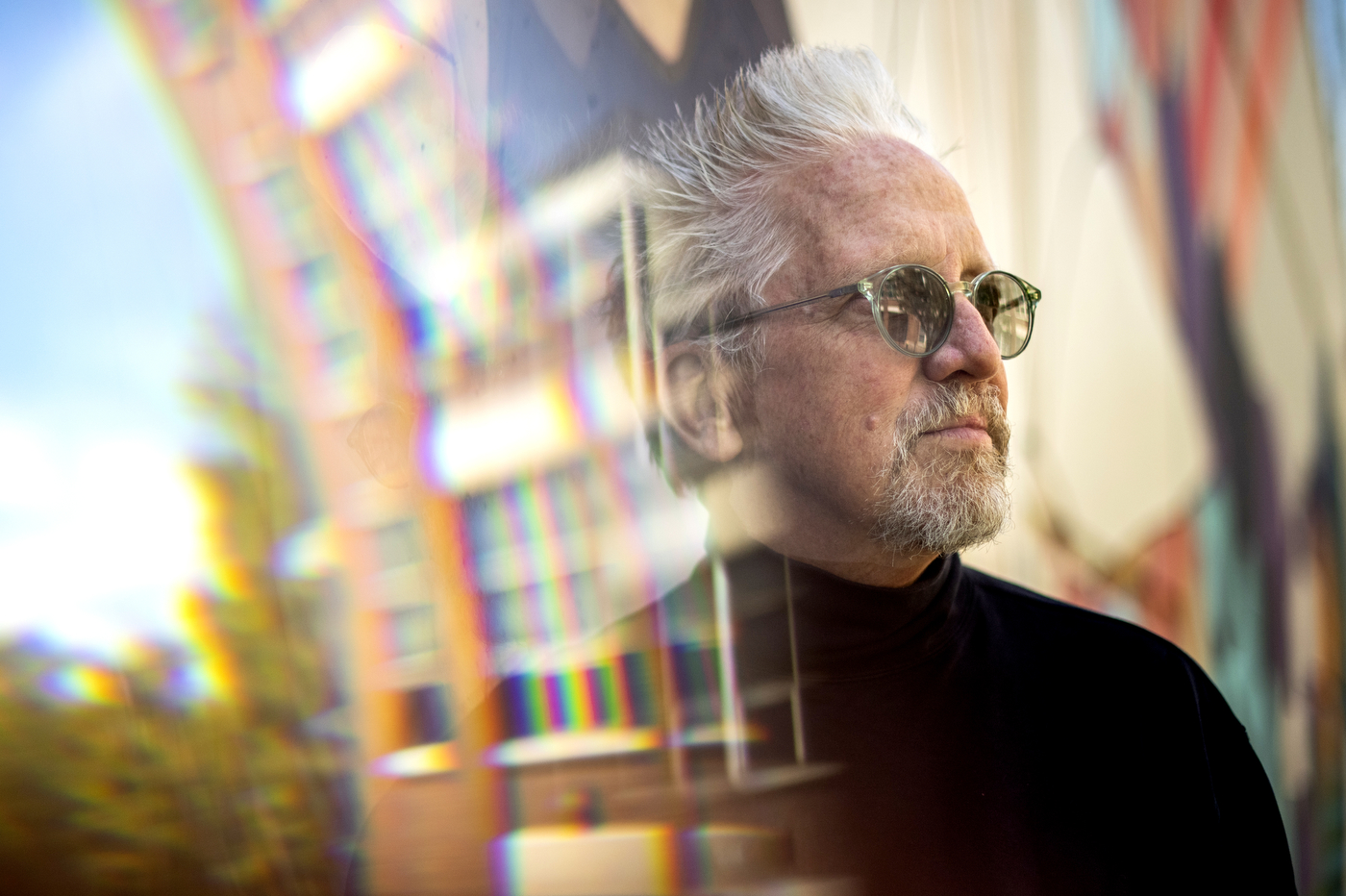
Back in the day, the music video for “Imagine That” was constantly playing in the Green Line Records office. Now, roughly two decades since his last release, Herlihy is back with “Postcards From Kindergarten Vol. 1,” an EP of tracks written and recorded during the pandemic. Along with the release of the EP’s first single, “The Invisible Girl,” Herlihy performed at The Burren in Somerville on Sept. 16.
News@Northeastern recently caught up with Herlihy to talk about the new EP, his memories of O Positive and the Boston music scene, and the state of the music industry.
How did this EP come about?
Before the pandemic, I spent so much time traveling from point A to point B, from my house to school, so I never had time to write songs. I have this metaphor that a song idea is like a fish swimming around in this fishbowl in your skull. It might be there in the background, but then you get distracted—you have a class or work—and the fish is gone.
When COVID hit, I was stuck at home, I was always at point A. Suddenly all the water around my boat was very calm. And I could see the fish. I would just put on the voice memo app on my phone and grab my guitar and sing something, work on it, and then send an mp3 to my musician pals. I wrote about 60 songs during that period, not thinking I was going to do anything with them.
In 2021, when people began getting vaccines and you could go out again, I visited my cousin Beth Burnett, who is also a producer, and she said I could come down to her home studio in Rhode Island to record some songs. So I went down to her place.
We had this agreement that the sessions were going to be just like hi-tech kindergarten—we’re just going to get together and have fun and see what we can do. That’s because I see songs like writing postcards: if you read a postcard, it doesn’t need to be “War and Peace.” In fact, if you think you’re going to create some epic work, you can give yourself quality paralysis.
But kindergartners can do anything. You could give a kindergarten kid any prompt on the planet, and they’ll just do it. No kindergarten kid ever goes back and fixes their finger painting. So Beth and I agreed to take a kindergartner approach in the studio, and the songs were going to be “Postcards from Kindergarten.”
How long has it been since you’ve released music? How does this recording and release process compare to your past albums?
I was in a band called Toy Boat, which is a remnant of the O Positive guys, and we released a record before Napster, iTunes, at the dawn of the internet.
In 1995, I would have gone toe to toe with anybody about what it takes to be in a band. But things are very different now. Like, I know that it makes no sense to just drop an album online unless you’re Beyonce. It’ll sink like a stone, right? You have to learn how people consume things and seek out those who might listen. Luckily, that’s what my friend Paul Buckley, who runs Lunch Records, knows all about.
But really, I have no commercial expectations for the EP. I just want to like it, and I hope people who know me will listen to it. But I’m not doing it for a return on investment. Back with O Positive, I wanted to be the best band in the world. But now, I just want to like what I do and not compare or compete.
Can you tell me about O Positive and your experience in the ’80s Boston music scene?
Boston in the ’80s was an incredible music scene, and there were tremendous bands in town like Pixies, Tribe, and Scruffy the Cat. I was an undergrad at Boston College and a DJ at the school’s radio station during this period, and it was all such a huge part of opening up my brain to music.
I went to law school at BC after undergrad, and I still managed to stay on the radio station and play in bands. In 1979, my great friend Vahe Katros convinced his brother-in-law to give him $6,000 to send me to a recording studio in Vermont, so we recorded this punk song called “I Don’t Know How to Act.” I dropped the song off at WBCN and went right into law school.
Then one Sunday night in December, I’m driving home at 2 a.m. and Jerry Goodwin, the “Duke of Madness” on BCN, plays “I Don’t Know How to Act.” I’m like, what? It was getting all kinds of requests for airplay—no fake requests, either!
So now I’m really bummed out, because I could have pursued a music career, but I’m in law school. But I stuck with it and graduated, and I got a job at a white collar crime firm. The clients were just revolting, and after a little while, I realized that I didn’t want to wake up at 65 years old having wasted my heartbeats saving scumbags from their just desserts. So I quit being a lawyer to pursue singing.
I started O Positive because I was following my bliss. We rehearsed four nights a week, wrote like 20 songs and eventually got a gig at the (former) Channel (nightclub). I was still pondering being a lawyer, but I loved the gig so much that I decided that I couldn’t stop doing this.
We began getting regular gigs and some of my BC friends, many of whom have gone on to incredible careers, essentially became volunteer campaign staff for O Positive. They would get together and have meetings and make T-shirts—we had a lot of people helping us out.
So then this record label called Throbbing Lobster put out our first EP, which we recorded at Synchro Sound, the Cars’ old studio on Newbury Street. One song from that called “With You” became a huge local hit and sold like 40,000 copies, so all of a sudden we had some local mojo. We also got some music videos on a local video channel called V66, and basically every bar in Boston would have V66 on at the bar. Soon after that, we could do like two shows at the Paradise Rock Club in one day, both sold out.
We put out a second EP, and that had a big song called “Talking About Love.” It sold more records at the Harvard Square Newbury Comics in December of 1987 than any other record—more than REM, more than U2.
We signed to Epic in 1989 and we put out a pretty good record, but overall it was a fiasco. It was just the wrong time. It was pre-Nirvana—not that we sounded like Nirvana, but alternative rock wasn’t even a radio format in those days. We came out alongside Warrant, Winger and all these hair metal bands. There was no national outlet for us except for college radio. Also, a new president came to the label and tabled all videos for small bands. From a publicity standpoint, if your band didn’t have a video, you were dead on arrival.
So we left Epic because they didn’t want to do a second record. We sold a decent amount of copies but it wasn’t anything that merited a follow-up record. We eventually did one more record called “Home Sweet Head,” and we did our last show in January 1995. But being part of the Boston scene—all those clubs, all those bands, where music was the only game for people—it was really a renaissance period, and it was unbelievable to be part of.
David Crosby recently said in an interview with Stereogum, when asked about advice he had for aspiring musicians, “Don’t become a musician.” As someone who has been on both the artist and business sides of the industry, what would you tell aspiring musicians?
If you love it, do it. Surround yourself with friends and make a music scene. The more you surround yourself with supportive people, the more you brainstorm and percolate and make stuff, and then some of you might eventually do something.
Of course, sometimes betting the farm is a bad idea. The professionals who are really doing it, that’s a single digit percentage of people, right? You’re not gonna get 50% of the people in the world paying their mortgage with their guitar. But you gotta pay the rent. You can still make music, like what you do, and you surround yourself with people that like it, too. The tax collector isn’t interested in poetry, but it doesn’t mean that you have to put your guitar in a coffin and bury it. It’s important to keep music in your life.
If you think you can reach a big audience, then you’ve got to have a strategy and look at where the communities are. You need people on your team who are going to work just as hard on the “get paid” side as you’re working on the “be great” side. But I always tell my music industry students that you have to have fun, because this business doesn’t pay well enough for you not to have a good time while you’re doing it.
What is the Northeastern music industry program’s current pitch to prospective students—both on the program itself and the industry at large?
There’s a bunch of professors in the music department, and I regard each as a spoke in a wheel. Each of them brings their different passions and backgrounds to it, and as a result, you have a wheel that actually spins and carries weight. You have all of these professors who are very different from me, but we’re still all into music and I’m wowed by what they do. I’m pretty good at bringing my legal, entrepreneurial, and creative skills to a variety of contexts, whereas someone like Andrew Mall brings his analytical, musicological and ethnomusicological skills to the table.
I’m now teaching “intro to music industry,” which I haven’t taught in a long time but I began teaching again since I became the coordinator of the concentration. In the first class, I ask the students, who here has cried listening to music? And after like 10 seconds of looking around, basically everybody raises their hand. So then I say, who here has cried listening to music in the last month? Hands go up again.
I tell them to stick a pin in that for a second and take in this phenomenon, that music can bring you to tears. I also was a political science major, but there’s never a peer reviewed political science article I ever read that brought me to tears. There’s something about music that just inspires, and that’s why it’s worth doing.
How do you think the music industry landscape is going to look in the future, given what you’re seeing right now on campus?
The music industry concentration wants to produce thought leaders; people who want to make the music industry better—less misogynistic, more inclusive, and more transparent. So we ask the students, how do you effectuate change as an individual, as an employee, as a startup, as a promoter? What are the choices you can make? And I find that the current students are very concerned about making the future of the industry more inclusive, and more transparent, less discriminatory, and kinder overall. I have great faith in the students and great faith in music.
For media inquiries, please contact media@northeastern.edu.




